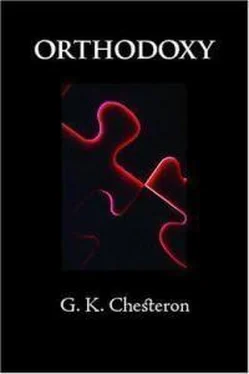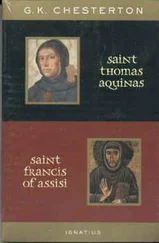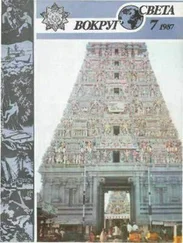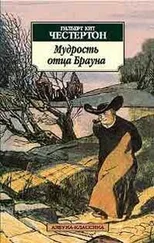And it must be remembered that the most purely practical science does take this view of mental evil; it does not seek to argue with it like a heresy, but simply to snap it like a spell. Neither modern science nor ancient religion believes in complete free thought. Theology rebukes certain thoughts by calling them blasphemous. Science rebukes certain thoughts by calling them morbid. For example, some religious societies discouraged men more or less from thinking about sex. The new scientific society definitely discourages men from thinking about death; it is a fact, but it is considered a morbid fact. And in dealing with those whose morbidity has a touch of mania, modern science cares far less for pure logic than a dancing Dervish. In these cases it is not enough that the unhappy man should desire truth; he must desire health. Nothing can save him but a blind hunger for normality, like that of a beast. A man cannot think himself out of mental evil; for it is actually the organ of thought that has become diseased, ungovernable, and, as it were, independent. He can only be saved by will or faith. The moment his mere reason moves, it moves in the old circular rut; he will go round and round his logical circle, just as a man in a third–class carriage on the Inner Circle will go round and round the Inner Circle unless he performs the voluntary, vigorous, and mystical act of getting out at Gower Street. Decision is the whole business here; a door must be shut for ever. Every remedy is a desperate remedy. Every cure is a miraculous cure. Curing a madman is not arguing with a philosopher; it is casting out a devil. And however quietly doctors and psychologists may go to work in the matter, their attitude is profoundly intolerant—as intolerant as Bloody Mary. Their attitude is really this: that the man must stop thinking, if he is to go on living. Their counsel is one of intellectual amputation. If thy head offend thee, cut it off; for it is better, not merely to enter the Kingdom of Heaven as a child, but to enter it as an imbecile, rather than with your whole intellect to be cast into hell—or into Hanwell.
Such is the madman of experience; he is commonly a reasoner, frequently a successful reasoner. Doubtless he could be vanquished in mere reason, and the case against him put logically. But it can be put much more precisely in more general and even æsthetic terms. He is in the clean and well–lit prison of one idea: he is sharpened to one painful point. He is without healthy hesitation and healthy complexity. Now, as I explain in the introduction, I have determined in these early chapters to give not so much a diagram of a doctrine as some pictures of a point of view. And I have described at length my vision of the maniac for this reason: that just as I am affected by the maniac, so I am affected by most modern thinkers. That unmistakable mood or note that I hear from Hanwell, I hear also from half the chairs of science and seats of learning to–day; and most of the mad doctors are mad doctors in more senses than one. They all have exactly that combination we have noted: the combination of an expansive and exhaustive reason with a contracted common sense. They are universal only in the sense that they take one thin explanation and carry it very far. But a pattern can stretch for ever and still be a small pattern. They see a chess–board white on black, and if the universe is paved with it, it is still white on black. Like the lunatic, they cannot alter their standpoint; they cannot make a mental effort and suddenly see it black on white.
Take first the more obvious case of materialism. As an explanation of the world, materialism has a sort of insane simplicity. It has just the quality of the madman's argument; we have at once the sense of it covering everything and the sense of it leaving everything out. Contemplate some able and sincere materialist, as, for instance, Mr. McCabe, and you will have exactly this unique sensation. He understands everything, and everything does not seem worth understanding. His cosmos may be complete in every rivet and cog–wheel, but still his cosmos is smaller than our world. Somehow his scheme, like the lucid scheme of the madman, seems unconscious of the alien energies and the large indifference of the earth; it is not thinking of the real things of the earth, of fighting peoples or proud mothers, or first love or fear upon the sea. The earth is so very large, and the cosmos is so very small. The cosmos is about the smallest hole that a man can hide his head in.
It must be understood that I am not now discussing the relation of these creeds to truth; but, for the present, solely their relation to health. Later in the argument I hope to attack the question of objective verity; here I speak only of a phenomenon of psychology. I do not for the present attempt to prove to Haeckel that materialism is untrue, any more than I attempted to prove to the man who thought he was Christ that he was labouring under an error. I merely remark here on the fact that both cases have the same kind of completeness and the same kind of incompleteness. You can explain a man's detention at Hanwell by an indifferent public by saying that it is the crucifixion of a god of whom the world is not worthy. The explanation does explain. Similarly you may explain the order in the universe by saying that all things, even the souls of men, are leaves inevitably unfolding on an utterly unconscious tree—the blind destiny of matter. The explanation does explain, though not, of course, so completely as the madman's. But the point here is that the normal human mind not only objects to both, but feels to both the same objection. Its approximate statement is that if the man in Hanwell is the real God, he is not much of a god. And, similarly, if the cosmos of the materialist is the real cosmos, it is not much of a cosmos. The thing has shrunk. The deity is less divine than many men; and (according to Haeckel) the whole of life is something much more grey, narrow, and trivial than many separate aspects of it. The parts seem greater than the whole.
For we must remember that the materialist philosophy (whether true or not) is certainly much more limiting than any religion. In one sense, of course, all intelligent ideas are narrow. They cannot be broader than themselves. A Christian is only restricted in the same sense that an atheist is restricted. He cannot think Christianity false and continue to be a Christian; and the atheist cannot think atheism false and continue to be an atheist. But as it happens, there is a very special sense in which materialism has more restrictions than spiritualism. Mr. McCabe thinks me a slave because I am not allowed to believe in determinism. I think Mr. McCabe a slave because he is not allowed to believe in fairies. But if we examine the two vetoes we shall see that his is really much more of a pure veto than mine. The Christian is quite free to believe that there is a considerable amount of settled order and inevitable development in the universe. But the materialist is not allowed to admit into his spotless machine the slightest speck of spiritualism or miracle. Poor Mr. McCabe is not allowed to retain even the tiniest imp, though it might be hiding in a pimpernel. The Christian admits that the universe is manifold and even miscellaneous, just as a sane man knows that he is complex. The sane man knows that he has a touch of the beast, a touch of the devil, a touch of the saint, a touch of the citizen. Nay, the really sane man knows that he has a touch of the madman. But the materialist's world is quite simple and solid, just as the madman is quite sure he is sane. The materialist is sure that history has been simply and solely a chain of causation, just as the interesting person before mentioned is quite sure that he is simply and solely a chicken. Materialists and madmen never have doubts.
Читать дальше








